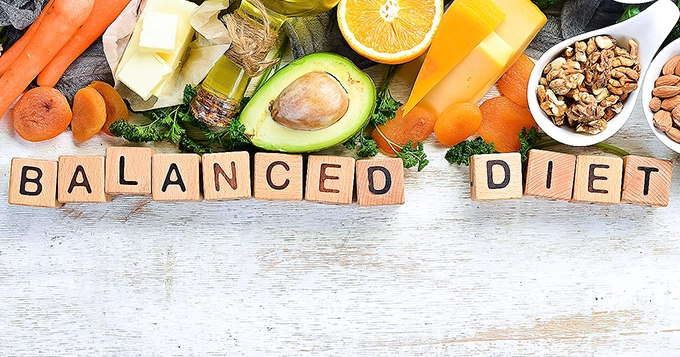In our fast-paced world, where convenience often trumps health considerations, the significance of maintaining a well-rounded diet is often underestimated when striving for a healthier lifestyle.
However, understanding the fundamentals of nutrition can be the key to achieving better overall health and well-being.
This article will explore the essential aspects of a balanced diet, why it matters, and how it can positively impact your life.
What is a balanced diet?
A balanced diet gives you all the essential nutrients, vitamins, and minerals in the recommended proportions to support overall health and well-being. It typically includes portions of various foods from different food groups, such as:
Fruits and vegetables: These provide vitamins, minerals, fiber, antioxidants, and natural sugars.
Lean proteins: Such as poultry, fish, lean meats, beans, and legumes, which supply protein and amino acids.
Whole grains: Like brown rice, whole wheat, oats, and quinoa, which offer carbohydrates, fiber, and various nutrients.
Dairy or dairy alternatives: Yogurt, milk, and cheese (or their plant-based counterparts) for calcium and other nutrients.
Healthy fats: Such as avocados, nuts, seeds, and olive oil, provide essential fatty acids.
Water: Staying well-hydrated is crucial for bodily functions.
A balanced diet involves consuming these foods in appropriate portions to meet your energy needs while helping you maintain a healthy weight. It also means avoiding or limiting foods high in added sugars, saturated and trans fats, and excessive salt.
The specific requirements for a balanced diet can vary depending on individual factors, including age, sex, activity level, and overall health goals. Consulting with a nutritionist, dietitian, or healthcare professional can help tailor a balanced diet to meet your unique needs.
The Fundamentals of Nutrition
Carbohydrates: Carbs are the primary source of energy for your body. Whole grains, fruits, and veggies are excellent sources of complex carbohydrates, providing long-lasting energy and essential fiber.
Proteins: Proteins are the building blocks of the body, supporting the growth and repair of tissues. Sources like lean meats, eggs, fish, beans, and nuts are essential for a balanced diet.
Fats: Fats help absorb fat-soluble vitamins and are also a source of energy. Avocado, fish, nuts, seeds, and vegetable oil are examples of healthy fat sources.
Vitamins and Minerals: Numerous body processes depend on these micronutrients. Your body will flourish if you eat a varied diet full of different fruits and vegetables since it will provide you with a wide range of vitamins and minerals.
Water: Staying well-hydrated is critical for maintaining bodily functions: digestion, circulation, and temperature regulation.
Impact of a Balanced Diet
A balanced diet ensures that your body receives the necessary nutrients it needs for optimal health.
Improves Heart Health
Eating healthy foods can really boost your heart’s health. Eating fruits, veggies, whole grains, lean meats, and good fats helps lower bad cholesterol levels and control your blood pressure. Through balanced nutrition, you keep your heart strong and reduce the risk of heart problems like heart attacks and strokes.
Better Glucose Management
Your meal’s carbohydrate content has the biggest impact on your blood glucose levels. Regular meals and distributing your carbohydrate intake throughout the day will help you sustain your energy levels without significantly raising your blood glucose levels.
In particular, fiber can assist with blood sugar regulation. Unlike other carbohydrates, fiber doesn’t raise blood sugar levels since the body can’t absorb and break it down. This can support maintaining your blood sugar within the desired range.
Stronger Bones and Teeth
Building and maintaining strong bones can be facilitated by eating a well-balanced diet. To maintain the health of your bones, you need enough calcium, and vitamin D facilitates the body’s absorption of calcium.
Reduced Risk of Certain Cancers
Antioxidants, which are abundant in plant-based diets, strengthen your immune system and aid in the defense against cancer cells.
Numerous vitamins, minerals, and antioxidants found in fruits and veggies can help lower your chance of developing cancer in specific digestive system parts, such as the mouth and stomach.
Helps with Weight Management
Maintaining a balanced nutrition can help with metabolic issues. Metabolic balance is essential for maintaining a healthy weight and overall well-being, as it ensures that your body efficiently processes and utilizes nutrients.
Provides Energy
A well-balanced diet provides sustained energy throughout the day, helping you stay active, alert, and productive.
Improves Brain Function
Nutrient-rich foods are essential for brain health and cognitive function. A balanced diet can improve memory, concentration, and overall mental well-being.
Better Mood
Good nutrition can also have a positive impact on mood and emotional well-being. A properly nourished body is better at handling stress and maintaining a positive outlook on life.
Conclusion
A balanced and nutritious diet, paired with regular exercise, is essential for the overall population to obtain the energy and essential nutrients necessary for survival and well-being.
Embrace the power of a balanced diet and make improved food choices to improve your overall health. Your body will thank you for it.








